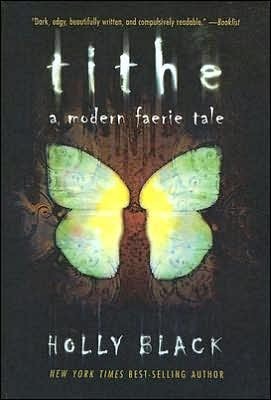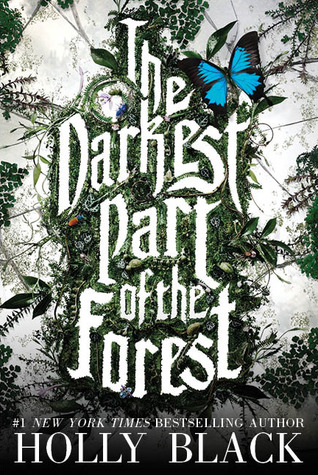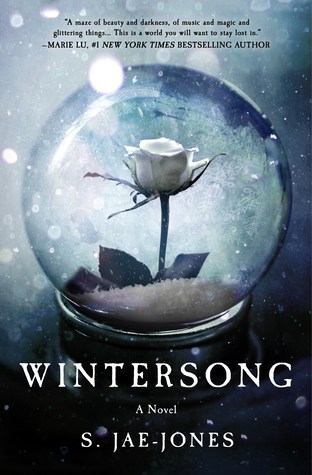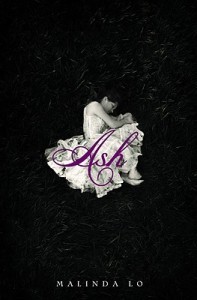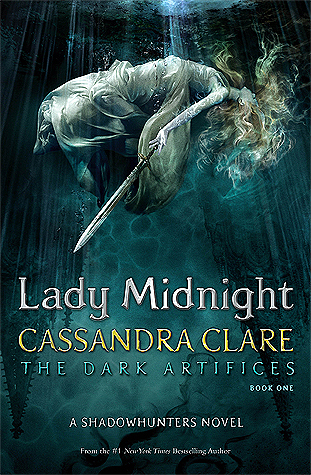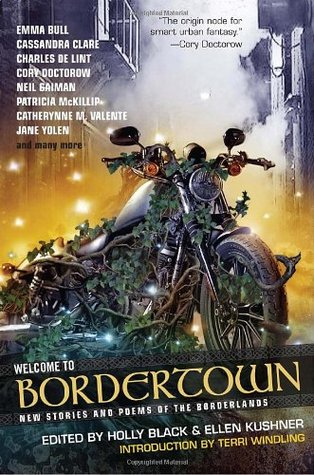Holly Black Explains Our Fascination with Faeries
Holly Black is one of the YA world's premier experts on faeries (she also has the pointy ears to prove it). Her enchanting books include The Modern Faerie Tales, The Curse Workers, and most recently The Folk of the Air series (the first installment was recently nominated in the 2018 Goodreads Choice Awards). Here Black discusses why faeries are so alluring to us mere mortals and answers all our questions about her upcoming book, The Wicked King.
Faeries might look like us, but they are not us. Unlike vampires, who were people, or werewolves, who still are (at least most of the time), faeries are completely other. They have their own taboos and their own moral systems.
They laugh at funerals and cry at weddings. They cannot lie. They live eternal lives. If they are like anything, they are like the weather. Sometimes they are warm breezes and sometimes they are lightning storms. And there's not much mortals can do but get out of their way.
I got my idea of what faeries were primarily from a book called Faeries, illustrated by Brian Froud and Alan Lee. It was full of folklore, sketches, and paintings that imagined faeries as alternatively (and sometimes simultaneously) horrifying and majestic. From that book I found my way to lots more folklore and became utterly fascinated with these capricious and dangerous beings.
They are like the natural world in another way, in that an encounter with a solitary faerie creature reveals that hidden around us is an entire ecosystem. The helpful hob who does errands in exchange for a crust of bread and a bowl of cream suggests there's a whole troop of faerie lords and ladies as well as trolls and goblins, redcaps and merfolk, nixies and pixies and sprites.
And they do not live in a land far away, but instead inhabit our hidden, liminal spaces. Just as nature can take back man-made buildings with surprising swiftness, hungrily covering mansions with ivy and moss, so too do faeries seem to hover at the edges of our industrial world, waiting for their chance to fit themselves into more spaces.
Our world feels bigger and stranger with that possibility. But there's something else that draws me to faerie stories: the idea of ruinous beauty. Like faerie fruit—one glorious taste of which will render all other food ashes in your mouth—one taste of faerie can leave mortals looking for a way back in for the rest of their days, pining for the loss of that magic. Their world is so good that it's terrible, and that's the very sort of story I like best.
____
Goodreads: What can fans expect from The Wicked King?
Holly Black: If The Cruel Prince asks questions around what Jude would do to get power, The Wicked King asks what she's willing to do to hold onto it. Plus, there are two marriages, murder, and merfolk!
GR: Let's talk about Jude and Cardan. Their dynamic has been tumultuous (to say the least!) since the beginning. In what ways has it shifted in the sequel?
HB: Well, The Wicked King begins with Cardan being the High King of Elfhame, but also under Jude's control. He's furious, having been tricked into that position. But though they are at odds with one another, the larger world of truces, alliances, and potential usurpers is circling them, searching for weaknesses. Either they will find a way to put their differences aside or they stand to lose everything—not only the throne of Elfhame, but also their lives.
GR: Jude is a mortal human living among the faeries. Despite their mistreatment of her, she chooses to do this. What continues to draw her to this world?
HB: Jude is human, but she grew up in the faerie realm, having been raised by the murderer of her parents—the Grand General of Elfhame, Madoc. And having grown up here, she considers it to be her home. It's what she knows best and the world she feels as though she fits into now. But she's also come to love magic, and a world without it seems to be a very dull place to her.
GR: On that note, what continues to draw Prince Cardan to Jude?
HB: I think Cardan started out envious of Jude. Madoc loved her, even though she wasn't his biological daughter and she wasn't a faerie, while his parents never cared much for him. And she was better than he was with the sword and better at school, in large part because she tried really, really hard and he barely bothered to try at all.
As a faerie prince, though, a mortal wasn't supposed to be better than he was, so he both resented her and was fascinated by her. The more he paid attention, the more he found her compelling—particularly her unwillingness to back down and her ability to give as good as she got. Before he knew it, he was drawn to her and horrified at himself for feeling that way.
GR: What books do you recommend for faerie fans?
They laugh at funerals and cry at weddings. They cannot lie. They live eternal lives. If they are like anything, they are like the weather. Sometimes they are warm breezes and sometimes they are lightning storms. And there's not much mortals can do but get out of their way.
I got my idea of what faeries were primarily from a book called Faeries, illustrated by Brian Froud and Alan Lee. It was full of folklore, sketches, and paintings that imagined faeries as alternatively (and sometimes simultaneously) horrifying and majestic. From that book I found my way to lots more folklore and became utterly fascinated with these capricious and dangerous beings.
They are like the natural world in another way, in that an encounter with a solitary faerie creature reveals that hidden around us is an entire ecosystem. The helpful hob who does errands in exchange for a crust of bread and a bowl of cream suggests there's a whole troop of faerie lords and ladies as well as trolls and goblins, redcaps and merfolk, nixies and pixies and sprites.
And they do not live in a land far away, but instead inhabit our hidden, liminal spaces. Just as nature can take back man-made buildings with surprising swiftness, hungrily covering mansions with ivy and moss, so too do faeries seem to hover at the edges of our industrial world, waiting for their chance to fit themselves into more spaces.
Our world feels bigger and stranger with that possibility. But there's something else that draws me to faerie stories: the idea of ruinous beauty. Like faerie fruit—one glorious taste of which will render all other food ashes in your mouth—one taste of faerie can leave mortals looking for a way back in for the rest of their days, pining for the loss of that magic. Their world is so good that it's terrible, and that's the very sort of story I like best.
Goodreads: What can fans expect from The Wicked King?
Holly Black: If The Cruel Prince asks questions around what Jude would do to get power, The Wicked King asks what she's willing to do to hold onto it. Plus, there are two marriages, murder, and merfolk!
GR: Let's talk about Jude and Cardan. Their dynamic has been tumultuous (to say the least!) since the beginning. In what ways has it shifted in the sequel?
HB: Well, The Wicked King begins with Cardan being the High King of Elfhame, but also under Jude's control. He's furious, having been tricked into that position. But though they are at odds with one another, the larger world of truces, alliances, and potential usurpers is circling them, searching for weaknesses. Either they will find a way to put their differences aside or they stand to lose everything—not only the throne of Elfhame, but also their lives.
GR: Jude is a mortal human living among the faeries. Despite their mistreatment of her, she chooses to do this. What continues to draw her to this world?
HB: Jude is human, but she grew up in the faerie realm, having been raised by the murderer of her parents—the Grand General of Elfhame, Madoc. And having grown up here, she considers it to be her home. It's what she knows best and the world she feels as though she fits into now. But she's also come to love magic, and a world without it seems to be a very dull place to her.
GR: On that note, what continues to draw Prince Cardan to Jude?
HB: I think Cardan started out envious of Jude. Madoc loved her, even though she wasn't his biological daughter and she wasn't a faerie, while his parents never cared much for him. And she was better than he was with the sword and better at school, in large part because she tried really, really hard and he barely bothered to try at all.
As a faerie prince, though, a mortal wasn't supposed to be better than he was, so he both resented her and was fascinated by her. The more he paid attention, the more he found her compelling—particularly her unwillingness to back down and her ability to give as good as she got. Before he knew it, he was drawn to her and horrified at himself for feeling that way.
GR: What books do you recommend for faerie fans?
A historical fantasy that features a compelling goblin king and the clever heroine who must outwit him. Lush and lovely, with a fabulous sequel!
The first book in an ongoing mystery series about a changeling who has been trying to straddle a life in the modern-day human world with one in the faerie world. This is an adult book, but I think that teen readers would love this series, too.
In this retelling of Cinderella, in which things do not go as we might think, the protagonist is drawn toward the faerie world, partially due to a love of magic and stories and partially because she associates it with her lost mother. But if she goes to the faerie world, she will be leaving behind the Huntress, with whom she has a vital bond of a different kind.
The story of a mortal swept away into the faerie world by a prince of the realm, who's furious with her for painting him with the mortal weakness of sorrow in his face. This is a road trip adventure (though mostly on foot) with two unlikely companions who learn about one another on the way.
A historical fantasy about a brave young girl who discovers a passage into a cold and strange faerie world underground. One of the best faerie queens I've ever read.
After exploring other aspects of the Shadowhunter world in The Dark Artifices, we learn much more about faeries, and over the course of the series even visit the extremely decadent Unseelie Court. Veers between humor and horror in the best possible way.
Melissa's return to the faerie realm is set in an alternate near future, where a grieving faerie queen wishes to wipe out humanity. Many points of view allow us to explore the world and to be especially surprised when not all is as it seems.
Another non-YA book, although The Blue Girl by Charles de Lint is YA. I come back to this again and again and am delighted every time. After getting dumped, our heroine drinks too much and winds up seeing into a world that ought to have been hidden from her. She and her best friend wind up drawn into a conflict in the faerie realm, one that will change their lives forever.
OK, I am cheating a little, since I had something to do with this, but the original shared-world anthology series, edited by Terri Windling, was one I read when I was a teenager. This is a collection of stories by the original writers and by new writers who were influenced by the books.
What are your favorite faerie books? Let us know in the comments!
Check out more recent articles:
The Best Young Adult Books of January
Laini Taylor Reveals the Allure of Forbidden Love
32 Big Books that YA Fans Can't Wait for in 2019
Check out more recent articles:
The Best Young Adult Books of January
Laini Taylor Reveals the Allure of Forbidden Love
32 Big Books that YA Fans Can't Wait for in 2019
Comments Showing 1-34 of 34 (34 new)
date newest »
newest »
 newest »
newest »
message 1:
by
Taylor
(new)
Jan 07, 2019 10:49AM
 Love all of the book suggestions! I'll probably come back to this list after inhaling the Wicked King and waiting for the last book.
Love all of the book suggestions! I'll probably come back to this list after inhaling the Wicked King and waiting for the last book.
flag
 I just added pretty much all the book recommendations to my TBR! But I won't read anything before I get my hands on my Wicked King!! 🙈
I just added pretty much all the book recommendations to my TBR! But I won't read anything before I get my hands on my Wicked King!! 🙈
 There are many downfalls with time zones when living in Australia. But for once I am so damn happy. Time to read!!!!
There are many downfalls with time zones when living in Australia. But for once I am so damn happy. Time to read!!!!
 Thank you for all the book suggestions! I've been trying to find more books with fairies in them! Also, I cannot wait for the Wicked King!!
Thank you for all the book suggestions! I've been trying to find more books with fairies in them! Also, I cannot wait for the Wicked King!!
 Looking forward to reading The Wicked King! I loved The Cruel Prince and can't wait for the mail tomorrow!
Looking forward to reading The Wicked King! I loved The Cruel Prince and can't wait for the mail tomorrow!
 One of my favorites is of course Tithe by Holly Black and The Perilous Gard by Elizabeth Marie Pope, which introduced me to the world of faeries. Can't wait for the Wicked King 👑!!!!
One of my favorites is of course Tithe by Holly Black and The Perilous Gard by Elizabeth Marie Pope, which introduced me to the world of faeries. Can't wait for the Wicked King 👑!!!!
 I wish i could say the same but i will not be able to have the book so soon. I'm very envious. While i wait, i will numb my eagerness with the book suggestions.
I wish i could say the same but i will not be able to have the book so soon. I'm very envious. While i wait, i will numb my eagerness with the book suggestions.
 Faerie is my favorite theme in fantasy books. We have great authors exploring the theme out there, but no one knows how to build a faerie world so detailed as Holly. She is the supreme queen of faerie folk!
Faerie is my favorite theme in fantasy books. We have great authors exploring the theme out there, but no one knows how to build a faerie world so detailed as Holly. She is the supreme queen of faerie folk!
 Yessss. Holly Black is #1 in my book for writing about faeries! She is the queen!! Can't wait to start reading The Wicked King tonight!
Yessss. Holly Black is #1 in my book for writing about faeries! She is the queen!! Can't wait to start reading The Wicked King tonight!
 The Gallow and Ragged series by Lilith Saintcrow, "where the faery world inhabits diners, dive bars and trailer parks." Highly recommended!
The Gallow and Ragged series by Lilith Saintcrow, "where the faery world inhabits diners, dive bars and trailer parks." Highly recommended!
 ha all the australians getting the wicked king before everyone else, sometimes time zones are great 👌
ha all the australians getting the wicked king before everyone else, sometimes time zones are great 👌
 Holly is my all time favourite faerie author, but I also love Melissa marr, Cassandra Clare and Sean McGuire - love that they’re all on Holly’s list!
Holly is my all time favourite faerie author, but I also love Melissa marr, Cassandra Clare and Sean McGuire - love that they’re all on Holly’s list!I also love worlds that include not only faeries, but other mythical/ supernatural creatures and really recommend Patricia Briggs, ilona Andrews and the author of the dead witch walking trilogy (I can’t remember their name!!)
 I'm in for a bit more of wait for my Wicked King book because I had to have the B&N exclusive edition. Darn my insatiable need for more Holly content! ALSO did you hear the word about Tithe, Valiant and Ironside being bound into one book coming this year? I'm so delighted!
I'm in for a bit more of wait for my Wicked King book because I had to have the B&N exclusive edition. Darn my insatiable need for more Holly content! ALSO did you hear the word about Tithe, Valiant and Ironside being bound into one book coming this year? I'm so delighted! Faerie books I recommend: Bones of Faerie by Janni Lee Simner (the aftermath of faerie and the human world going to war. It's got some really neat concepts in it!) and Irregulars by Nicole Kimberling (which has a couple stories based on different things but the faerie one is one of the neatest of the 4 stories, although all really evocative)
 There are many great books that include faeries or take place in or on the border of the realm of Faerie, but few make the faeries in them as intriguing and lush of a character as the Gentleman with the Thistledown Hair who leaps from the pages in “Jonathan Strange and Mr. Norrel“ .
There are many great books that include faeries or take place in or on the border of the realm of Faerie, but few make the faeries in them as intriguing and lush of a character as the Gentleman with the Thistledown Hair who leaps from the pages in “Jonathan Strange and Mr. Norrel“ . The character, to me, is the benchmark for the “other”, the strange Faerie trickster who holds no connection to the morals and ways of our own world. His power is great, his deals slippery and the effects are devastating. And all for his own unending amusement.
 Loved the book suggestions. I have even read one.
Loved the book suggestions. I have even read one. I just received my copy of The Wicked King and I cant wait to read it. The year long wait is going to drive me crazy I can imagine with all the good reviews I have been reading.
 Just bought three of her book suggestions so far. I just finished The Wicked King today and I absolutely need a Fae distraction so I don't go crazy between now and when the next book releases!
Just bought three of her book suggestions so far. I just finished The Wicked King today and I absolutely need a Fae distraction so I don't go crazy between now and when the next book releases!
 Taylor wrote: "Love all of the book suggestions! I'll probably come back to this list after inhaling the Wicked King and waiting for the last book."
Taylor wrote: "Love all of the book suggestions! I'll probably come back to this list after inhaling the Wicked King and waiting for the last book."That's what I'm here for. I don't even seek out Faire books normally, but I finished "THe Wicked King" today and it's left me hungry for more of this type of world.
 Aya wrote: "Im going to binge read this series!"
Aya wrote: "Im going to binge read this series!"Oh girl, I wish I'd been smart like this. Those of us who already devoured the Wicked King are sitting here thinking, "what?! Now we wait a year?!"
 Thanks for all the book recommendations... More to add to my shelves. Holly Black has got me into Faerie.
Thanks for all the book recommendations... More to add to my shelves. Holly Black has got me into Faerie.
 Love Holly’s books. I have the Book of Faeries that she references in her interview. It’s fascinating and terrifying all at once.
Love Holly’s books. I have the Book of Faeries that she references in her interview. It’s fascinating and terrifying all at once.
 The Wee People....how well do I know if them...A great deal...They exist in Irish lasses and sometimes a few men. Me sainted Mom was one of the wee as is my brother. It goes back to rhetoric an WestmoReland when trenches were able or could interpret dreams. My Mom an brother often had conversation ps with each other. The thing I remember to The most is that would write down the time and date. My Mom was in Pensacola, To and my brother was in the attic underwater in a Submarine. They did this all the time. Now one of my grand daughters has been awarded the same gift. Only no ine is available to lead her they the trial and tribulations of being one of the wee people. I have seen her sit and talk just like she is carry on a conversation with someone else. I have always kept an open mind and I was glad I did. My spouse is it Irish descent and she has the dreams and it takes her a little longer to figure them out. This s blessing to have this gift, but it is mostly kept hidden because to many do not understand. I read a many novels about the Faeries as I can. Some are fantastic, some good and some the run of the mill. You do kow King Arthur was one of the wee ones. Read your literature on Excalibar. May you be with God before the devil knows you are dead....DEHS
The Wee People....how well do I know if them...A great deal...They exist in Irish lasses and sometimes a few men. Me sainted Mom was one of the wee as is my brother. It goes back to rhetoric an WestmoReland when trenches were able or could interpret dreams. My Mom an brother often had conversation ps with each other. The thing I remember to The most is that would write down the time and date. My Mom was in Pensacola, To and my brother was in the attic underwater in a Submarine. They did this all the time. Now one of my grand daughters has been awarded the same gift. Only no ine is available to lead her they the trial and tribulations of being one of the wee people. I have seen her sit and talk just like she is carry on a conversation with someone else. I have always kept an open mind and I was glad I did. My spouse is it Irish descent and she has the dreams and it takes her a little longer to figure them out. This s blessing to have this gift, but it is mostly kept hidden because to many do not understand. I read a many novels about the Faeries as I can. Some are fantastic, some good and some the run of the mill. You do kow King Arthur was one of the wee ones. Read your literature on Excalibar. May you be with God before the devil knows you are dead....DEHS
 Please excuse my comouter. It changes words and I do not always catch the errors or the computer will make the changes after I send the message.....DEHS
Please excuse my comouter. It changes words and I do not always catch the errors or the computer will make the changes after I send the message.....DEHS
 I love the Chronicles of Faerie by O. R. Melling; Faeriewalker series by Jenna Black; Acotar by SJ. Maas; Faefever by Karen Marie Moning; Lightness Saga by Stacey Brown and of course Modern faerie tales by Holly Black. I have yet to read The Cruel Prince but I'm planning on it.
I love the Chronicles of Faerie by O. R. Melling; Faeriewalker series by Jenna Black; Acotar by SJ. Maas; Faefever by Karen Marie Moning; Lightness Saga by Stacey Brown and of course Modern faerie tales by Holly Black. I have yet to read The Cruel Prince but I'm planning on it.
 I'm really surprised Emma Bull's War for the Oaks isn't on here, considering she even references Emma Bull in her books!
I'm really surprised Emma Bull's War for the Oaks isn't on here, considering she even references Emma Bull in her books!



